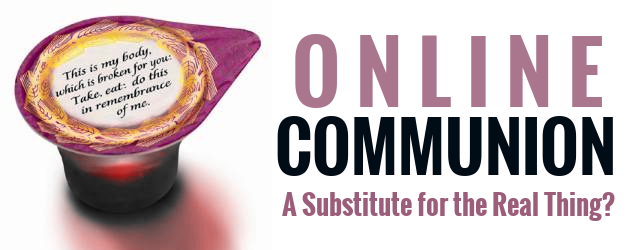Aristotle, Plato, Communion and the Internet
A few posts ago there was a mention of our time’s preference to the Aristotelian ideal over the Platonic ideal. That is a fancy way of saying that we put the emphasis on the material (what we can see and measure) over the transcendent. Recently the UMC is engaged in a conversation about the viability of online communion. Online communion is the idea that an elder can invite someone at their home who is participating in worship via online/television to grab some bread and juice and take communion at their home.
Needless to say people weighing in on the validity of the sacrament via the internet. I wonder if our resistance to online communion is rooted in the idea that what is real is what is material. "Real" community is those who are in the same physical space breathing the same physical air. "Real" community is that gathering of people that can be touched, counted, measured and seen. Could it be that our understanding of community is influenced more by Aristotle's teaching of what is "real"?
In a conversation with my friend Kyle he mentioned that the online communion conversation sounds something like reverse Gnosticism. Whereas Gnosticism elevated the Spirit over the material today we elevate the material over the Spirit.
Elevating the Material or the Spirit over the other is neither helpful nor loving.
If the Body of Christ is mystical, if we are surrounded by such a great cloud of witnesses, if we are all tied together in the single garment of destiny, then can we really say the sacraments are only valid in the material or the Spirit?
Truthiness and Christianity
While on a retreat I was reminded of the 2006 Merriam-Webster's word of the year - Truthiness.
Truthiness may not be a word everyone is aware of, but if you are a Colbert Report fan, then you are well aware of the definition of "truthiness". The best definition I have heard came from Loyd Allen who defined it this way: "the preference for facts we wish to be true over the facts that are known to be true."
During a time in the retreat I was on, the question came, "if you believe in God, then turn to you neighbor and tell them why you believe in God."
I heard in my group a series of people say that they believe in God because humans cannot make trees or the sun so there must be a God. I hear other people say that they believe in God because it holds their beliefs together - to remove God from the structure would result in a collapsed worldview. Others tried to express they believe in God because of some evidence that points them in that direction.
I get it. It is difficult to express why we believe in God. However most of the conversation that I hear about why people believe in God (or much of anything for that matter) comes back down to our preference to truthiness than Truth.
And so, I want to offer up a reminder that Christianity is not a religion that primarily seeks Truth. Christianity is a religion that primarily seeks Love.
I am not afraid of truthiness because we all - atheist and deist alike - have a preference for the facts we wish to be true over the facts that are known to be true. I try not to waste my time in changing other people's minds. I will spend my time changing people's hearts.
This is the change I wish to see.
Hats
I do not like to wear hats because they never fit right.
Which is why I prefer hats that form around my head.
Fitted baseball hats, toboggans, even bandannas are welcomed because,
These hats conform, they are comfortable.
These are the hats my friends wear and we all agree hats should be made to conform to us.
And this crown of thorns I was given, I rarely put it on.
It does not conform to me.
I must conform to it.

Be the change by Jason Valendy is licensed under a Creative Commons Attribution-NonCommercial-ShareAlike 3.0 Unported License.





